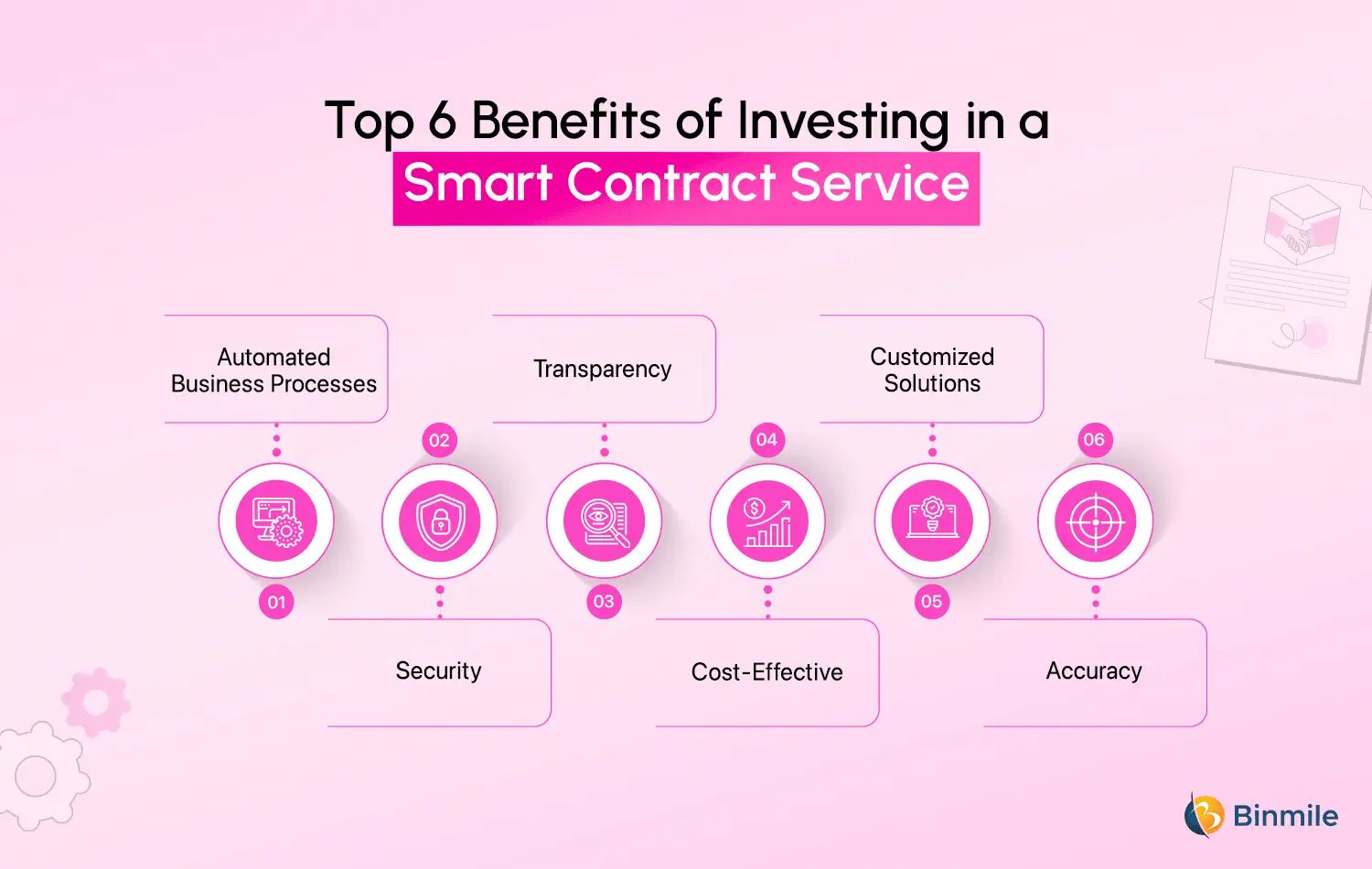Businesses often struggle to maintain transparency while conducting core business transactions. With traditional contract management systems, businesses were at risk of disputes between the parties to the agreement, often resulting in the cancellation of business services. Here comes smart contract development, addressing these issues by providing an automated and cost-effective solution.
Unlike traditional contracts, these smart contracts ensure security and provide a completely transparent environment. Also, these contracts reduce the manual work, making them a useful tool for businesses seeking to automate their transaction processes. After reading this blog, you will be able to implement the step-by-step creation process of a smart contract, thus enhancing efficiency by streamlining your business processes.
What is Smart Contract Development?
A smart contract is a self-executing contract between two or more parties as a digital agreement. These smart contracts are stored on a blockchain platform, typically Ethereum, Cardano, Polkadot, etc., and are written using a predefined set of conditions. When these conditions are met, the contract is automatically executed, without the need for third-party intermediaries to execute it.
Ethereum introduced “Smart Contracts” in 2015 after the conceptualization of the topic by the cryptographer Nick Szabo. Traditional contracts were often prone to manipulation and human error, making them risky for parties in that agreement. Smart contract development’s main objectives were to address these issues and reduce fraud losses and malicious exceptions.
6 Key Advantages of Smart Contract Development
When compared with traditional contracts, smart contract development services offer various advantages. Below are some of the key advantages.

1. Automated Business Processes
One of the most important advantages of using smart contracts is their ability to automate the core business processes, such as releasing funds or salary, supply chain management, etc. This ability eliminates the need for manual checks and then transacts the process based on the conditions.
With Ethereum smart contract development, businesses can enhance their workflows and operate more efficiently, leading to greater growth opportunities.
2. Security
Smart contracts are built using cryptographic algorithms of blockchain technology. This makes it a highly secure contract, as it is nearly impossible to tamper with or alter the data. Also, if there is any sensitive information regarding the personal details, these are all encrypted and only accessible to authorized parties of the contract. This enhances the contract’s integrity, fostering trust in businesses using this concept.
3. Transparency
Smart contracts enable businesses to facilitate transparent transactions by providing the blockchain’s recording functionality. With the help of blockchain, you can record all your contract terms and can easily audit whenever needed by the business. This high level of transparency reduces the dispute risk, as all the parties involved will now have access to the database ledger.
4. Cost-Effective
By eliminating the need for third-party intermediaries, businesses can reduce their overall costs, leading to a more efficient process. When there is no broker or lawyer involved, the transaction can be done directly with the automation process, ultimately avoiding high commission fees. Also, this helps them avoid manual paperwork and instead focus more on the business’s key functionalities.
5. Customized Solutions
Smart contracts meet all types of business-specific needs by offering unparalleled flexibility. This helps companies to design their contracts with unique rules and conditions based on their system requirements. For example, if the business wants a tracking system contract, after receiving the specific product, it will automate the payment based on the actual and the expected delivery time.
6. Accuracy
Smart contracts use high-compatibility programming languages such as Solidity, Vyper, Scilla, etc., for precise and accurate coding. For example, if the contract is for payment transactions, the code ensures that the payment amount and the schedules are exact as mentioned by the parties. These languages significantly reduce errors and minimize misunderstandings, providing better assurance to all the parties involved.
Challenges Involved in the Adoption of Smart Contract Development
While smart contracts provide an effective way for handling business agreements and transactions, there are some challenges that need to be addressed for the correct adoption of these contracts.
1. High Gas Costs
Smart contracts offer benefits to be efficient, but this leads to high gas costs during deployment and execution of contracts. Gas costs refer to the fees for performing the transaction on the system. For this not to happen, business owners need to optimize their contracts to balance the overall cost. This can be a time-consuming process if not partnered with a reputable app development company that provides better cost insights.
2. Immutable Blockchain Platform
Smart contracts are often rigid contracts that cannot be easily modified when deployed on a particular blockchain platform. This nature makes it difficult to update or fix any required section of the contract. Developers need to balance this situation by adopting some proxy patterns or modular designs. This will help in maintaining the integrity and also provide some flexibility for any future changes.
3. Comply With Legal Authorities
Smart contracts need to stay perfectly aligned with official regulatory compliances, which often vary with the different jurisdictions. If there are any changes in laws, businesses need to create new contracts with those updates. Non-compliance with these legal and regulatory requirements leads to hefty fines or even suspension of the contract.
4. Malicious Attacks
Smart contracts are often an easy target for malicious attacks, as they are open-source and publicly available in nature. If not adopted, secure measures like secure coding practices, frequent audits, rigorous testing, etc., can lead to significant financial losses.
Drive real results with secure, scalable smart contract development—let's build faster, smarter, and with confidence alongside industry experts.

How to Create a Smart Contract Development: A Step-By-Step Process
Smart contracts are often complex to understand, and successfully implementing them involves rigorous attempts. We understand that, so to ease the process, here are some of the key steps to building a smart contract that helps you reduce manual intervention and costs.

1. Identifying Specific Business Needs
This is the most crucial step, as defining the particular requirements will lead to a better understanding of what to build and the functionalities to add. Conducting proper research, defining the scope, and aligning with the business’s strategic goals is the hour in need for building an efficient smart contract.
2. Designing the Structure
After analyzing and defining the requirements, the next step is to carefully design the contract’s architecture. Here, developers also need to choose one blockchain network and a framework, ensuring complete management of the data and records.
To minimize any potential bugs or vulnerabilities, businesses need to validate the data and store it securely. This phase often involves defining functionalities, the type of data, encryption methods needed or not, and creating flow process diagrams for better interaction.
3. Development and Testing
The development phase involves the main coding process, which starts with businesses needing to choose a blockchain-compatible language, such as Solidity, Scilla, and Vyper. Ensure that during the development process, you meet all the requirements, use modular programming, and involve a rigorous testing process. By adopting secure coding practices, businesses can secure their contracts and make the automation process more reliable.
4. Performing Security Audits
Auditing the contracts is a necessary step before moving on to the deployment phase. Smart contracts should undergo rigid audits to ensure that the contract is risk-free. This enhances transparency and builds trust between the two or more parties who signed the contract agreement.
5. Deployment
Smart contract’s deployment phase involves making the contract live by making the functional code live. Always ensure that the deployment process is seamless and the relevant parties can access it easily. The process should be cost-effective; typically, considering gas fees and network conditions is necessary.
6. Monitoring and Maintenance
Post-deployment phase, the contract should be meticulously monitored and instantly updated if any issues need to be addressed. By exploring the analytics tools of blockchain, businesses can ensure that they provide efficient and error-free contracts. Also, if there are any future requirements, make sure to add modularity in your code for ease in the upgrading process.
Top Use Cases of Smart Contract Development
Smart contract development services are providing immense flexibility and benefits across various industries. Here, we have discussed the top 5 use cases of smart contracts.
Finance
The BFSI sector significantly benefits from leveraging smart contract development services. With the help of these smart contracts, DeFi applications offer automated financial services such as claims processing, lending, borrowing, trading, and management. These smart contracts enable decentralized exchanges, eliminating the need for intermediary peers and thus creating a trustless system. This automation process removes the need for lengthy paperwork and simplifies the peer-to-peer transactions.
Healthcare
Smart contracts with a Blockchain platform enable the healthcare industry to maintain a database of all the medical records. This unified database can be accessed by the authorities only, ensuring that the patient details remain confidential. These records are usually tamper-proof because of the Blockchain’s immutability functionality, thus managing and streamlining healthcare effectively. Here, automation of complex billing processes is also done, resulting in reduced financial fraud.
Gaming
Smart contracts act as the main backstage management in the vast gaming industry. Earlier, players didn’t have their assets in the game, ultimately losing the investment when the game stopped or they stopped playing. With the help of NFTs (Non-Fungible Tokens) and Smart contracts, this problem was fixed. Players can have NFTs and sell them whenever needed to generate income.
Supply Chain and Logistics
Blockchain allows tracking of shipments and inventory management in real time, overall enhancing the transparency of goods. This streamlines the process, from production to the delivery phase, and also eliminates the risk factors. Applying smart contracts can help decrease fraud risks as it removes the dependency on verification intermediaries and also ensures the product remains authentic throughout the process.
Real Estate
Using smart contracts, the real estate industry benefits a lot when it comes to validating a mortgage. With smart contracts and a blockchain platform, real estate transactions can be tokenized, ultimately removing the role of an intermediary lawyer. Also, this helps in boosting the visibility of contract terms and conditions, directly fostering trust between the parties involved. The immutable nature of blockchain technology minimizes the chances of fraud and risk and speeds up the overall process.
Looking to transform your fintech operations with automation-first app development that simplifies compliance, scales faster, and enhances customer trust?

Key Takeaways from Smart Contract Development Guide
Smart contract services are ultimately reshaping the ideologies of businesses by offering transparent and secure business agreements and integrating blockchain for automated solutions. These smart contracts enable businesses from industries including finance, healthcare, gaming, etc., to enhance their efficiency by streamlining their business processes.
In this blog, we deep dive into creating a successful smart contract process, which can enhance and streamline your business processes. However, partnering with a skilled fintech development company can provide the right roadmap to transform your core operations.









